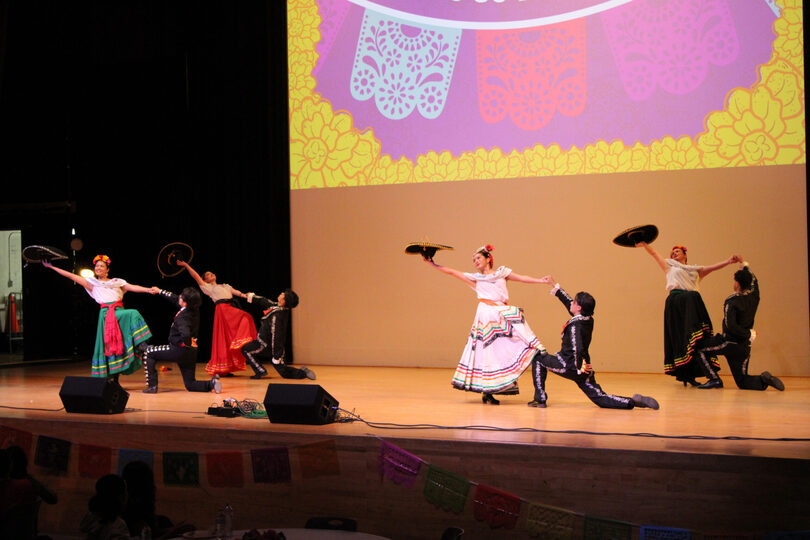Opinion: Día de Los Muertos celebrates grief as a continuation of memory

Día de Los Muertos is the annual Mexican celebration for the dead, honoring legacies of deceased family. Our columnist reminds students the importance of this remembrance, establishing this tradition nurtures community. Courtesy of Valeria Martinez Gutierrez
Get the latest Syracuse news delivered right to your inbox.
Subscribe to our newsletter here.
In Mexico, every altar of the dead is a love letter, every marigold flower an “I miss you” and every candle a promise that their light remains with us. Rituals like Día de Los Muertos – Day of the Dead – don’t eliminate the pain of our loved ones passing. Instead, they turn grief into a celebration of life and love. They’re a reminder that life doesn’t end after death if our loved ones’ memory remains, challenging the Western narrative that sorrow encapsulates death.
My welito, or grandpa, Juan, passed away in February. He was an angel, a pan de Dios, and my biggest inspiration in leading an intentional and noble life. I wasn’t able to make it to his funeral due to the 2,000-mile distance, so celebrating him for the first time this Día de Los Muertos weighed especially heavily on my heart.
To love Mexicanly is to love so abundantly that it keeps pouring after death. I have my Welo Juan and Welo Rigo to thank for my bleeding heart, and it’s in their honor that I work so hard to share cultural emblems like Día de Los Muertos on campus.
We traditionally welcome back our loved ones as a community in Mexico, and the Mexican Student Association enabled us to spread our cultural wealth at Goldstein Auditorium through our Día de Los Muertos Celebration last Wednesday.
More than 150 people attended the collaborative effort with the Haitian American Student Association, Lambda Theta Alpha, La Lucha, South American Latine Student Association and the Central American Student Association. Each organization tabled with transnational emblems of memory to encompass how we cross-culturally honor loved ones.
Day of the Dead isn’t mutually exclusive to Mexico, and we wanted to highlight how the colloquial celebration of death unites all Latin Americans, especially within the context of our escalating ethnic persecution.

Katie Crews | Design Editor
Existence is resistance: having events like Día de Los Muertos on campus echoes our collective chants that we’re not hiding who we are. Instead, we’re proud to extend the warm hug we welcome our passed loved ones with to our peers and spread the love and beauty our culture bestows upon us.
I, a Remembrance Scholar, dedicated an Altar de Muertos to the 33 Syracuse University students, 11 Lockerbie Residents and the flight crew who died in the PanAm 103 flight. Scholars left items like pancakes, candy and lollipops to welcome back their representatives, with candles and marigolds guiding their way back to campus.
On this Day of the Dead, we also remember the migrants whose lives have been unfairly taken by state-enforced political violence, from deaths in detention centers to police brutality to genocides funded by our taxes.
We remember those who have been pushed out of their homes and have passed in their pursuit of the alleged American dream. We honor the lives that are no longer here by remaining present in the fight for fair treatment.
As long as someone’s memory is honored, their legacy palpitates with every heartbeat. In my house, we have an Altar de Muertos year-round. My mom and I used to decorate it together each year before I moved away for college. Loss of this tradition would erase the multigenerational efforts of honoring passed ones’ legacies and neglect our ancestral commemoration of our roots.
Student-run events like Día de Los Muertos are not only marks of resistance, but also nurture community-building spaces that foster the cross-cultural understanding imperative to wellness and liberation.
I wear my heart on my sleeve for the love my grandpas showed me was possible, the kind they never held back in giving. Although they’ve passed, my heart has only grown – a fruit of the legacy that remembering them has nurtured my justice-driven narrative. Radical love and hope are treatments for a fractured society, and Día de Los Muertos fuels the path to rebuilding a community centered on compassion.
In Oaxaca, families break bread, celebrate and spend the night at family members’ tombstones. Candles illuminate the night, and the waft of pan dulce in the air is just as prominent as the love encapsulated in the night.
Celebrations are led differently in regions of Mexico and Latin America, but the one constant is the light that continues to shine through remembering, reflecting and celebrating loved ones who’ve passed. Unity takes effort in a hyper-individualistic society, but traditions such as these nurture unison.
Valeria Martinez-Gutierrez is a senior majoring in geography, sociology and environment, sustainability and policy. Her column appears bi-weekly. She can be reached at vmarti10@syr.edu.





